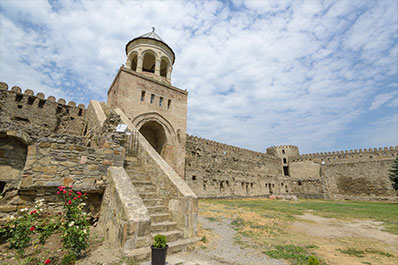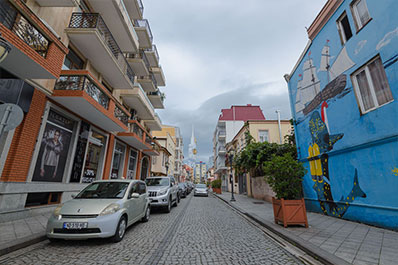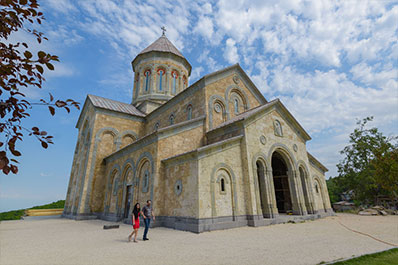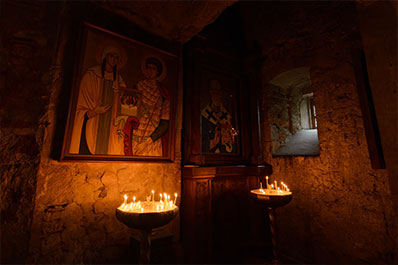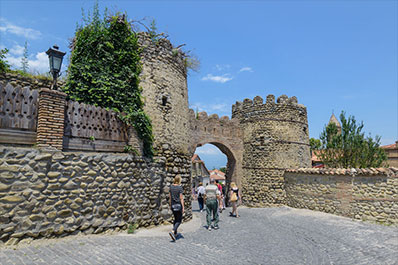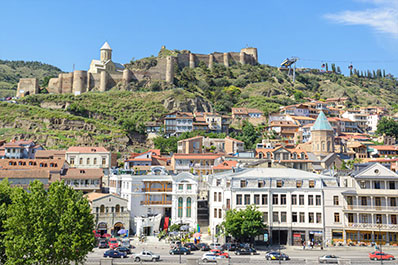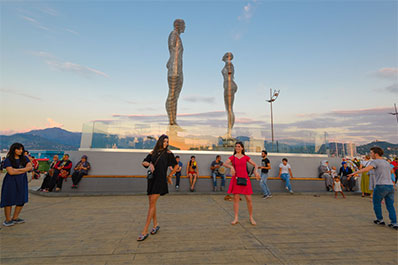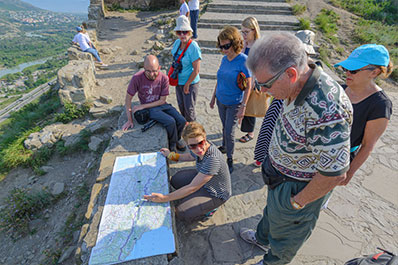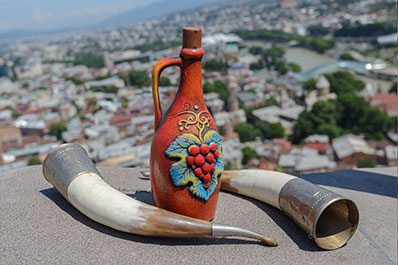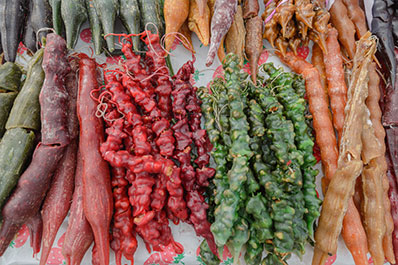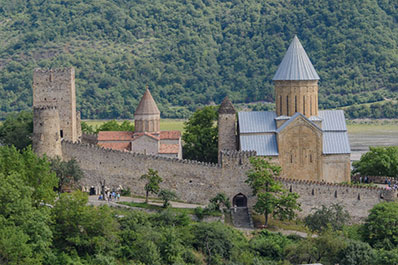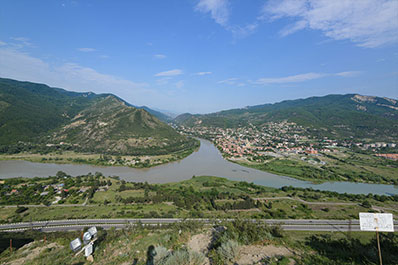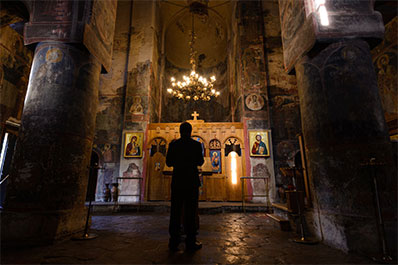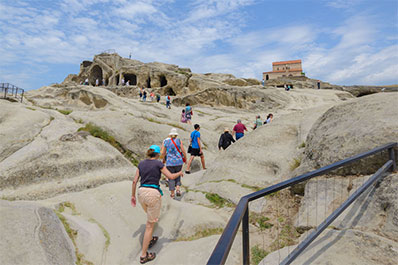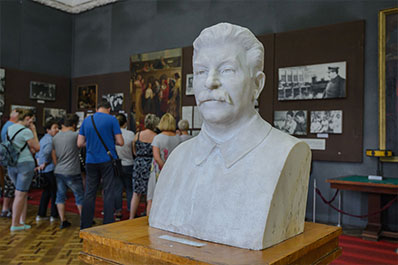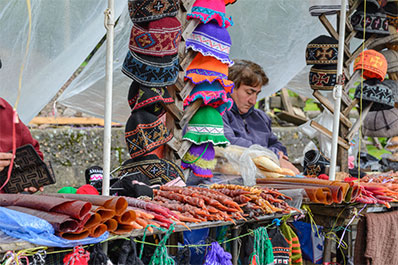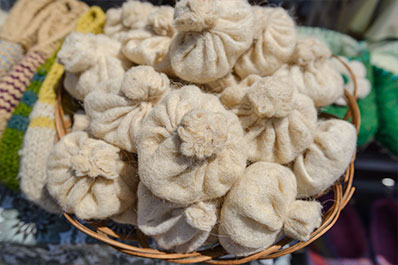Georgia Travel Guide
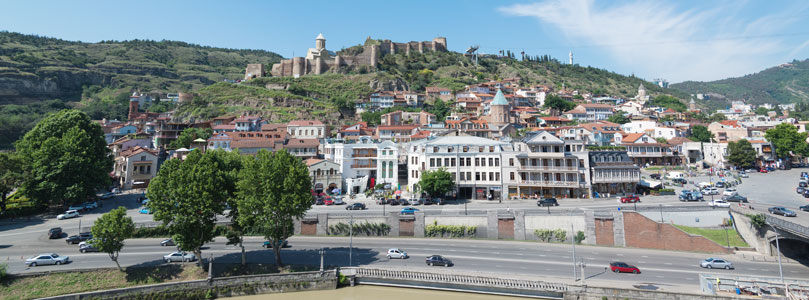
The Republic of Georgia has been growing in popularity as a tourist destination, and today is the most popular country to visit in the Caucasus. Recognizing its own potential, Georgia is actively working to become one of the most tourist-friendly destinations in the world. Which brings us to the question that many ask about this little Eurasian nation…
What is Georgia known for?
Apart from being one of the cheapest countries to visit in Europe, Georgia is known for its stunning Caucasus mountains, including Mt. Kazbeg, one of the highest points in Europe and site of the Holy Trinity Church. On its west coast is the Black Sea, where visitors can rest in Batumi and other resort towns.
Georgian history is phenomenal. There’s Kutaisi, one of the world’s oldest cities; Ushguli, one of the highest continually inhabited settlements in Europe; Vardzia, a cave monastery; and Gori, the hometown of Stalin.
Georgia is rumored to have some of the best wine in the world and a national cuisine worth traveling the globe in order to sample. Don’t worry about weight gain, though, as you’ll stay busy skiing or hiking in the mountains, swimming in the Black Sea, wandering the cobblestone streets of Tbilisi and climbing up to cathedrals and monasteries preserved from the past.
Scroll the Georgia Travel Guide below to learn more about this magical country.
General information about Georgia
Capital of Georgia: Tbilisi
Population: 4 million (2019)
National Language: Georgian
Religion: Georgian Orthodox (83.4%), Islam (10.7%), Roman Catholicism (2%) Judaism, other (3.9%)
Electricity: 220V AC, 50 Hz; type C and F round two-pin plugs are standard
Time zone: GMT+4
International dialing code: +995
Georgia currency: Georgian Lari (GEL)
When should I go to Georgia?
Georgia is beautiful and full of activities year-round, so when to visit depends largely on what you wish to see and do in country. The Black Sea on Georgia’s West Coast and the Caspian Mountains on Georgia’s northern and southern borders contribute to the country’s diverse and humid climate. As a general rule, the west is warmer with more rainfall, while the east is colder and drier.
Georgia’s main tourist season falls in July and August, and while Tbilisi sees average temperatures of 30-35 degrees (86-95 F), the rest of the country is pleasantly warm. Black Sea resort towns are perfect this time of year, while the mountains are pleasant for hiking and camping.
To avoid the peak tourist season while still cashing in on the sunny summer days, consider traveling in June or September, when the weather is a bit more temperamental but overall still warm, pleasant and green.
In autumn the country is clothed in a tapestry of fall colors that will delight the eye. If traveling in late September or October, be prepared for rainy weather and frequent changes in temperature.
Winter descends in November, remains until March and is marked by cold, snowy weather. The exception is Tbilisi, which sees significantly less snowfall than the rest of the country. Winter sports enthusiasts will find Georgian winters a perfect match, and non-athletic tourists willing to brave the cold will appreciate the country’s snowy white landscape.
Planning your visit over a major local holiday, such as New Year, Christmas (January 7th), Independence Day (May 26) or one of Tbilisi’s many summer festivals, can add an extra flair to your Georgia vacation.
Is Georgia visa-free or do I need a visa for Georgia?
Georgia allows for visa-free entry for up to one year for citizens of over 90 countries, just one more reason why you should plan to come and spend a long holiday here!
For those not eligible for the visa-free entry, a multiple-entry electronic visa, valid for 30-90 days (depending on your passport country) may be obtained online. The cost is just over 20 USD and applications are usually processed within 5 business days.
Other nationalities must apply for a visa from a Georgian embassy or consulate. Taiwan passports are not officially recognized by Georgia.
Anyone who holds a residence permit or visa to the EU, US and a handful of western nations are officially permitted entry into Georgia for up to 90 days.
For further information on Georgia tourist visa regulations and to determine which rules apply to your passport country, please refer to our Georgia Visa Requirements page.
What airlines fly into Georgia?
Georgia is well serviced by over two dozen airlines that offer routes from multiple countries in Asia, Europe and the Middle East. The following airlines offer regular flights in and out of Shota Rustaveli Tbilisi International Airport (TBS):
The most popular flights in and out of Tbilisi fly from Amsterdam, Beijing, Dubai, Istanbul, Moscow, Munich, Tel Aviv, Vienna, Warsaw, Almaty, Baku, Minsk and St. Petersburg.
Kutaisi International Airport is a 3-4 hour drive from Tbilisi and is serviced by discount airlines, including RyanAir and WizzAir. Public transportation is available from Kutaisi Airport into Tbilisi.
Further information regarding specific routes, flights times and ticket purchases may be found on the airline websites or by contacting our travel agents.
Can you travel to Georgia by land?
Georgia shares multiple land borders with neighboring Russia, Turkey, Armenia and Azerbaijan, giving convenient access for tourists on a multi-country tour. Nearly all of the borders are open 24/7, save the Vakhtangisi/Sadikhli border with Azerbaijan and the Akherpi/Privolnoe border with Armenia.
Currently there is only one functioning land crossing between Georgia and Russia, the Dariali/Verkhniy Lars border point, and you will need to take a bus or taxi in between the border crossings.
Georgia can also be reached from Armenia via the overnight train from Yerevan to Tbilisi, which typically runs every night from June-September and every two nights in the off-season. You’ll stop at the border in the middle of the night but are not required to disembark, as the border patrol officers will come to your cabin to process your passport.
You may also enter Georgia by ferry, which connects the city of Batumi on the Black Sea coast with Sochi, Russia (5 hrs), Chernomorsk, Ukraine (48 hrs) and Varna, Bulgaria (60 hrs). Less reliable is the ferry service on the Caspian Sea, connecting Baku with Turkmenbashi, Turkmenistan and Aktau, Kazakhstan. Departure times and lengths for these routes vary wildly depending on the cargo, weather and space availability at port.
Is it safe to travel to Georgia?
Georgia is safe to visit, having a very low rate of violent crime and terrorism in comparison with most Western countries. Local police are considered helpful and trustworthy. The country welcomes several million tourists a year and most travelers report feeling very safe and relaxed during all of their Georgia travels.
Most governments currently advise against visiting the disputed territories of South Ossetia and Abkhazia, although these areas see thousands of Russian tourists per year. South Ossetia may only be entered from Russia; Abkhazia may currently be entered via Georgia or Russia but requires a separate visa, and the Georgia crossing is subject to sudden closure.
As with many nations in the region, the primary inconvenience you’re likely to experience is the quality of some of the roads outside of Tbilisi and the often erratic, irresponsible local drivers. It may sound basic, but cross the streets with caution and be aware of the cars around you. Avoid travel after dark on poorly kept or unlit roads.
In addition, exercise standard cautions when hiking or camping in the mountains – check the weather forecast before entering a remote area, and plan to stay on well-marked trails unless you’re accompanied by an experienced guide.
Is Georgia safe to travel alone?
Georgia is safe not just for groups of tourists, but for adventurous solo travelers, thanks to the Georgian people who are eager to ensure you leave with a positive impression of the country.
The primary difficulties faced by tourists traveling alone in this country will likely be the many questions they may receive as to why they are traveling alone. Georgians have a group mentality, and anyone traveling alone may invite their pity and curious stares.
Although women sometimes receive more attention than they are accustomed to at home, this is rarely accompanied by a feeling of being unsafe. On the contrary, most solo travelers agree that they would gladly return to Georgia in a heartbeat.
Single travelers who wish to connect with others while in country can find good company in the hostels during peak season or by joining a small group tour, including the Solo Female Friendly Small Group Tour, City Tours, Day Tours or longer trips offered in our Georgia tourism packages.
What language do they speak in Georgia?
Anyone who appreciates languages will find themselves in a linguistic paradise in Georgia. The official language of the country is Georgian, one of the 10 oldest language in the world. Written in a unique script, Georgian is unrelated to any other language in the world save three minority languages also spoken within Georgia.
Due to Georgian’s multiple dialects, unique writing system, grammatical ambiguity and love for consonants (of which up to 8 may appear in a word without being separated by a vowel), it’s considered one of the most difficult languages in the world to learn. But that shouldn’t stop visitors from trying, for even learning a few words will endear you to the Georgian people.
Pockets of Georgian speakers can also be found in Turkey and Azerbaijan. Minority languages spoken within Georgia include Azerbaijani, Laz, Svan, Asssyrian, Urum and Russian, the latter of which is spoken by most of the population as a second language.
Do they speak English in Georgia?
English is currently vying with Russian for the spot of ‘primary 2nd language of Georgia’. Many younger people speak at least basic English, and as is the case in most countries, you’ll have a much easier time finding an English speaker in the capital and larger cities than you will in the rural areas.
Roughly half of Georgians under 30 will speak at least basic English, while middle-aged and older people rarely do, unless they work in the tourist industry. Nearly everyone working at guesthouses, hotels and major tourist attractions will know enough English to communicate.
Most street signs are written in Georgian and English.
A basic knowledge of Russian will also be helpful during your Georgia travels.
Is Tbilisi worth visiting?
Travelers to Georgia will not want to overlook Tbilisi, one of the most developed cities in the Caucasus that’s replete with charm, comfort and life. Far from the grim Soviet façade of other former USSR towns, Georgia’s capital is the perfect blend of new and old, a city that truly reflects Georgia’s location in the heart of Eurasia.
Tourists can easily plan to spend 2-3 days in Tbilisi, and more time if your schedule allows. It can also be a great stopover point between mountain excursions and village homestays.
Highlights of the city include sightseeing in the Old Town, a dip in the Abanotubani sulfur baths and tours of the Holy Trinity Cathedral and other houses of worship. Spend half a day shopping at Station Square Bazaar or swimming and hiking around Lisi Lake park complex. Grab some street food or dine in one of Tbilisi’s finer restaurants. Take the cable cars to Kus Tba or Narikala Fortress, where you’ll have amazing views of the city.
For more detailed information on Georgia’s capital city, check out our page on Tbilisi/Tbilisi City Tours.
What food do they eat in Georgia?
Visitors to Georgia are advised to come with a large appetite to appreciate the wide selection of tasty national dishes. Georgia is known for its high-quality meats, breads, spices and elaborate cooking methods. While it’s impossible to give a full overview of Georgia’s cuisine here, some of the most popular dishes include:
- Khachapuri, a hot savory cheese bread whose shape and thickness varies depending on the region and cook.
- Khachapuri Adjaruli – a sumptuous delight consisting of fresh cheese bread topped with egg and butter, this dish takes Khachapuri to a whole new level.
- Khinkali – Delectable dumplings stuffed with finely chopped meat and onions to create a juicy filling.
- Chanakhi – meat and vegetables stewed slowly in small clay pots.
- Chaqapuli – delicious lamb stew often served at holidays.
- Mtsvadi - beef kebabs cooked with eggplant or marinated in wine.
- Tolma – grape leaves or other vegetables stuffed with meat and spices.
- Kharcho – aromatic beef soup with plums, rice and nuts.
Apart from dairy products such as matsoni (fresh yogurt) and sulguni (cheese), Georgia has a great selection of vegetarian dishes:
- Pkhali – cold appetizers made with a combination of fruits, vegetables, chopped nuts and fresh spices.
- Badrijani Nigvzit – grilled eggplants and nut paste, the combination of flavors in this dish is amazing.
- Lobio – thick bean soup often eaten with corn bread.
- Shetchmandy- special vegetarian soup made with flour, nuts and grains.
The country is likewise famous for its variety of breads – flat breads, stuffed breads, corn breads and cheese breads. If you’re planning to start a gluten-free diet, better to wait until after your Georgia trip.
As Georgia is considered the birthplace of wine, visitors will love tasting their wide selection of red and white wines, including Saperavi, Kisi, Tvishi and Mukado, as well as the local beer and brandy.
What should I wear in Georgia?
When packing for a trip to Georgia, you’ll want to include plenty of comfortable clothing for exploring the cities and countryside of this mountainous land. Some general guidelines:
- Comfortable shoes, including sturdy sneakers or hiking boots for the mountains, flip-flops for the beach and comfortable sandals for summertime in Tbilisi
- Shorts are acceptable in the cities and permissible in the countryside, yet are not commonly worn by locals outside of the capital
- Heavy rainfall can occur in almost any season, so it’s advisable to have an umbrella and fast-drying outfits on hand
- Sweaters and jackets may be needed even in the summer months during evening hours and at higher altitudes
If your Georgia travel itinerary includes winter sports, camping or trekking on the higher peaks, remember that the area is subject to heavy snowfall and subzero temperatures, and you should be prepared year-round with winter gear.
When visiting churches or monasteries, men need to wear a sleeved shirt with slacks and should remove their hat upon entering. Women should cover their knees, shoulders and hair, and wear a long skirt or dress.
Is Georgia an Islamic country?
Georgia is one of the oldest Christian nations in the world, and most of Georgia’s population belongs to the Georgian Orthodox Church, which has close ties with the Russian Orthodox Church.
Georgians are, by and large, a religious people: they hold saints in high regard, particularly St. George, and church attendance on religious holidays is a national tradition. Religious icons are common, and the people’s inherited faith impacts their worldview and societal norms. Although not officially acknowledged, superstitious practices are commonly intertwined with traditional Orthodox doctrine and, to a lesser extent, secular worldviews.
When visiting cathedrals or monasteries, it’s respectful, and sometimes required, to cover your shoulders and legs. Women will want to have a head covering available for such outings. Those who aren’t properly attired (men and women) will often be given large overcoats to wear while inside.
There is a significant Muslim minority that comprises roughly 10% of the country’s population. These are primarily Azeris, Chechens and Meskhetian Turks, as well as ethnic Georgian peoples. The Muslim population consists of both Shi’a and Sunni followers.
Is USD accepted in Georgia?
Georgian Lari (GEL) is the only accepted currency in Georgia, but USD, Euros, pounds, rubles and Turkish lira can all be easily exchanged at banks and exchange offices in the cities. (For other currencies, transactions must be made at the banks). In banks you’ll be required to present an ID before exchanging.
When making a transaction at the exchange office, check the rates and commission fees in advance, and don’t exchange until you’ve confirmed the amount of lari you’ll be receiving. Currency exchange offices can easily be found near tourist attractions, major hotels and shopping centers. There’s also a decent exchange office at the airport.
Major credit cards are accepted at many restaurants, shops and hotels in Tbilisi, but once outside of the capital, it’s best to have lari on hand.
ATMs are widely available in the cities and most of them accept Visa, MasterCard and Maestro. Outside of the cities, ATMs and exchange services may be hard to find, so it’s advisable to take plenty of lari with you.
Does Georgia have good internet access?
Georgia has high-speed 4G internet coverage in all of its cities, while connection is spottier in rural regions. All hotels and guesthouses and most restaurants and coffee shops in the cities provide decent Wi-Fi. If you’re worried about poor coverage in rural areas, consider purchasing a Wi-Fi modem for your mountain excursions.
Mobile service is usually fast and cheap in Georgia. There are three primary mobile service providers – Beeline, Magti and Geocell, all of which provide adequate coverage and package options suitable for tourists. Beeline tends to be the cheapest, but with poorer coverage outside the capital. Magti is the most expensive, but with the strongest coverage.
SIM cards may be purchased at the airport but expect prices to be highly inflated. Better yet, wait to purchase a SIM card at the company’s official service centers located on Rustaveli Street in Tbilisi, also found throughout the country. Expect to pay around 2 lari for a card and 5-25 lari for an internet package, depending on the company and package.
Is Georgia expensive for tourists?
Georgia can be a very economical country to travel, particularly when taking budget options into consideration:
Accommodation: Inexpensive hostels, homestays, budget hotels and cheap AirBnb rentals for groups are all widely available in Georgia’s bigger cities. Batumi is the most expensive city, surpassing even Tbilisi. Budget travelers should consider guesthouses run by local families, Couchsurfing or hostels, which are now in almost every city in Georgia. Average low-end prices are 7-20USD per night.
Food: Affordable yet tasty food is very easy to come by in Georgia, where even at a mid-range restaurant you can easily eat for under $10. To save money on food, consider a homestay with full board included, buying produce from the markets and cooking at home, or purchasing products from the bakeries for a filling snack or small meal. Avoid eating in tourist areas, where prices are nearly always inflated.
Attractions: Many of the major attractions in Georgia are free of charge, including all of the monasteries, while other attractions such as museums and cable cars cost a few USD at the most. To save further money on attractions and entertainment, consider traveling during the off-season, joining a day tour to sites that are harder to access and planning your trip so that you’ll only need to come and go from Tbilisi, the transportation and tourist hub of the country, one time.
Transportation: City and intercity transportation – including buses, marshrutkas (public vans) and trains, are cheap, if not the most comfortable or reliable. Expect to pay well under a dollar for city transport and less than $10 for most public cross-country travel. Other options include taxi (app. 1USD per 3km), car rental or hiring a driver, the latter two being the most expensive but comfortable and expedient options. If with a tour group, transportation will be provided for you.
What products come from Georgia, and what souvenirs can I find?
Georgia is famous for its wine, mineral water, walnuts and hazelnuts, and provides tourists with no small selection of gifts and souvenirs to choose from.
Edible souvenirs, including wine, nuts, cheeses, teas, homemade jams, honey, spices and local churchkhela candies can help to keep your memories of Georgia alive long after you’ve departed.
Enamel jewelry is vibrantly colorful and unique. Created by melting glass and metals together in an art passed down in Georgia through the centuries, enamel jewelry makes a distinctly Georgian gift.
Georgian tablecloths are very traditional and easy to carry home. They come in various shades of blue with white imprints of animals, nature and various designs, and recall the days when nearly every Georgian family would lay this cloth upon their dinner table.
Clothing items, including silk and woolen scarves, knitted hats, socks with uniquely Georgian imprints and bags of varying designs, sizes and colors can be found to suit nearly every personal taste.
Other items include pottery, ceramics, paintings, historical photos, old coins and Caucasian carpets.
If you’ve found this Georgia Travel Guide helpful, check out our travel guides for other Central Asian and Caucasus nations to learn more about the region!

